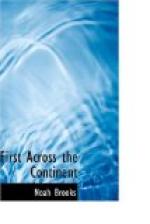The expedition was now advancing into a region inhabited by several wandering tribes of Indians, chief of which were the Ottoes, Missouris, and Pawnees. It was determined, therefore, to call a council of some of the chiefs of these bands and make terms of peace with them. After some delay, the messengers sent out to them brought in fourteen representative Indians, to whom the white men made presents of roast meat, pork, flour, and corn-meal, in return for which their visitors brought them quantities of delicious watermelons. “Next day, August 3,” says the journal, “the Indians, with their six chiefs, were all assembled under an awning formed with the mainsail, in presence of all our party, paraded for the occasion. A speech was then made, announcing to them the change in the government, our promises of protection, and advice as to their future conduct. All the six chiefs replied to our speech, each in his turn, according to rank. They expressed their joy at the change in the government; their hopes that we would recommend them to their Great Father (the president), that they might obtain trade and necessaries: they wanted arms as well for hunting as for defence, and asked our mediation between them and the Mahas, with whom they are now at war. We promised to do so, and wished some of them to accompany us to that nation, which they declined, for fear of being killed by them. We then proceeded to distribute our presents. The grand chief of the nation not being of the party, we sent him a flag, a medal, and some ornaments for clothing. To the six chiefs who were present, we gave a medal of the second grade to one Ottoe chief and one Missouri chief; a medal of the third grade to two inferior chiefs of each nation; the customary mode of recognizing a chief being to place a medal round his neck, which is considered among his tribe as a proof of his consideration abroad. Each of these medals was accompanied by a present of paint, garters, and cloth ornaments of dress; and to this we added a canister of powder, a bottle of whiskey, and a few presents to the whole, which appeared to make them perfectly satisfied. The air-gun, too,




